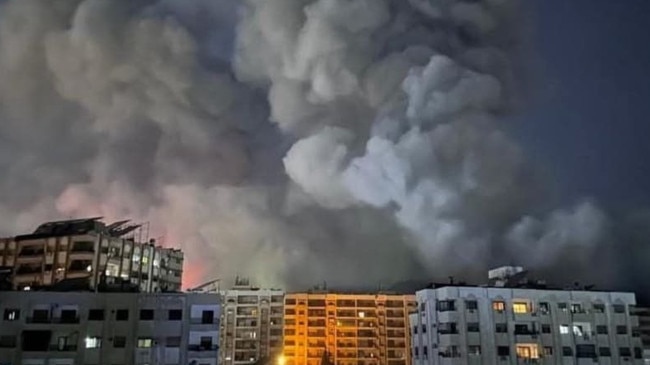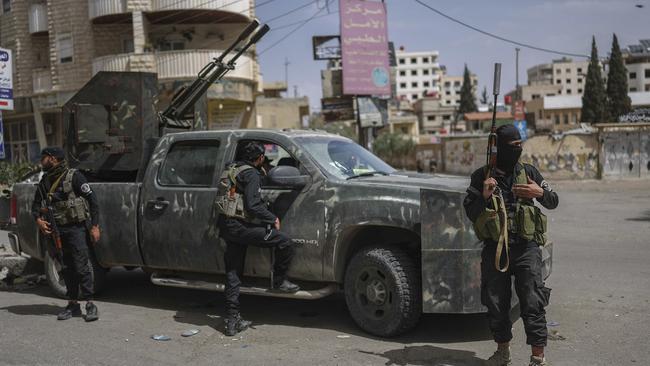Israel strikes near Damascus presidential palace ‘in message to regime’
Benjamin Netanyahu said the strikes near the presidential palace were a message that Jerusalem wouldn’t allow the regime to harm the Druze minority after sectarian violence left 102 dead.

The Israeli military has launched airstrikes near the presidential palace in the Syrian capital Damascus, after earlier warning it would intervene if Syrian authorities failed to protect the Druze minority.
Israeli “fighter jets struck adjacent to the area of the palace”, the Israeli Defence Forces said on Telegram, as Jerusalem called the strikes a “clear message” to the Syrian regime.
In a joint statement, Prime Minister Benjamin Netanyahu and Defence Minister Israel Katz said their government would not allow any harm to come to the Druze minority, after two days of sectarian clashes left 102 people dead.
Mr Netanyahu and Mr Katz said in the statement: “This is a clear message to the Syrian regime. We will not allow forces to be sent south of Damascus or any threat to the Druze community.”
âš¡ï¸ðŸ‡¸ðŸ‡¾ðŸ‡®ðŸ‡±BREAKING: Israeli Airstrikes Near Damascus Presidential Palace.
— Suppressed News. (@SuppressedNws) May 2, 2025
Israeli airstrikes targeted main roads around the Presidential Palace in central Damascus, cutting off access to the site. The strikes followed hours of Israeli drone activity over the capital, despite an… pic.twitter.com/Fc4GF5H5gf
Earlier on Thursday (local time) Syrian Druze spiritual leader Sheikh Hikmat al-Hijri had condemned what he called a “genocidal campaign” against his community and blamed extremists aligned with the regime for the violence.
“From our position in the spiritual leadership, we stand united with our fellow Syrians in rejecting this administration,” Sheikh Hijri said, urging immediate intervention by international forces.
Mr Katz had warned his country would respond “with significant force” if Syria’s new authorities fail to protect the Druze minority, whose representatives rejected any attempt to force them out.
Two days of fighting were set off by an audio recording purporting to feature a member of Syria’s Druze community criticising the Prophet Muhammad, and quickly escalated, with civilians and 16 members of the state security forces among the dead.
Fuelling the tensions are long-simmering concerns among the local Druze population – who practice a closely held religion that is an early offshoot of Islam – that Syria’s government of former jihadists can’t be trusted to keep them safe.
Those concerns have sparked anti-government protests, empowered Druze militias and drawn in Israel, which sees an opening in the community with strong family and historical links to Israeli Druze.

The violence poses a serious challenge to the Islamist authorities who ousted longtime ruler Bashar al-Assad in December, and comes after a wave of massacres in Syria’s Alawite heartland on the Mediterranean coast in March. Security forces and allied groups killed more than 1700 civilians, mostly from Assad’s Alawite community, according to the Syrian Observatory for Human Rights.
Israel’s Foreign Minister Gideon Saar urged the international community to “fulfil its role in protecting the minorities in Syria – especially the Druze – from the regime and its gangs of terror”.
At a meeting of Druze leaders, elders and armed groups in the city of Sweida, the community agreed it was “an inseparable part of the unified Syrian homeland”, a spokesperson said.
“We reject partition, separation, or disengagement,” the spokesperson added.
The Syrian Observatory said the fighting had involved security forces, allied fighters and local Druze groups.
The Britain-based monitor, which relies on a network of sources in Syria, said the 102 death toll included 30 government loyalists, 21 Druze fighters and 10 civilians, including Sahnaya’s former mayor, Husam Warwar.
In the southern Druze heartland province of Sweida, it said 40 Druze gunmen were killed, 35 in an “ambush” on the Sweida-Damascus road on Wednesday.
The monitor said the fighters were killed “by forces affiliated with the ministries of interior and defence and gunmen associated with them”.
Truces were reached in Jaramana on Tuesday and in Sahnaya on Wednesday. The government announced it was deploying forces in Sahnaya to ensure security, and accused “outlaw groups” of instigating the clashes.
However, Sheikh Hijri said he no longer trusts “an entity pretending to be a government … because the government does not kill its people through its extremist militias … and then claim they were unruly elements after the massacres”.
“The government (should) protect its people,” he said.
Israel sees the new forces in Syria as jihadists and has attacked hundreds of military sites in Syria since Assad’s overthrow. Jerusalem said its military would hit government targets “should the violence against Druze communities continue”.
It has also sent troops into the demilitarised buffer zone that used to separate Israeli and Syrian forces on the Golan Heights and voiced support for Syria’s Druze.
In a statement on Thursday, US State Department spokeswoman Tammy Bruce said the violence and rhetoric against the Druze community in Syria was “reprehensible and unacceptable”, and called on the interim authorities to hold perpetrators accountable.
AFP, Dow Jones



To join the conversation, please log in. Don't have an account? Register
Join the conversation, you are commenting as Logout